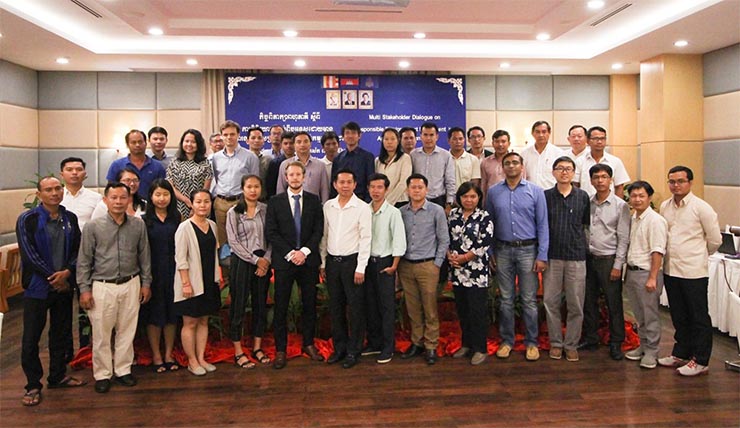
The role of investment, in particularly foreign direct investment (FDI), is regarded as one of the most important contributors to economic growth. The past quarter-century has witnessed remarkable growth in FDI flow all over the world. This is due to the fact that many countries, especially developing countries, see FDI as an important element in their overall strategy for economic development. FDIs contribute to the economic development of the host country through the augmentation of domestic capital and the enhancement of efficiency through the transfer of new technology, marketing, and managerial skills, innovation, and best practices. But FDI can also have negative impacts depending on the country’s specific conditions in general and the policy environment in particular.
For this purpose, OXFAM Cambodia, the Office of High Commissioner for Human Rights (UN-OHCHR), Action Aid in Cambodia, the NGO Forum on Cambodia, and the Mekong Regional Land Governance Program (MRLG) co-organized a Multi-Stakeholders Dialogue on Responsible Foreign Direct Investment in Agriculture in Cambodia. The Multi-Stakeholders Dialogue was attended by more than 50 participants. The participants included community representatives, development partners and NGOs, experts, agri-investment companies, Vietnamese Embassy, EURO Cham, and selective NGOs/IOs.
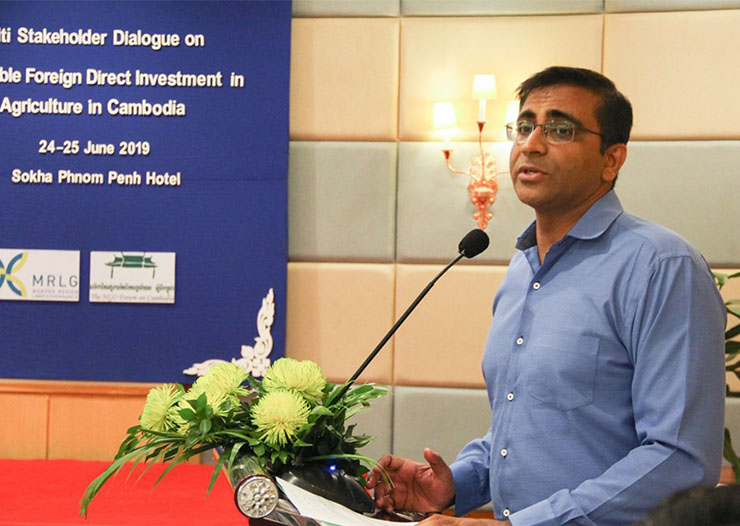
Mr. Biju Abraham, Head of Programs, Oxfam welcomed all participants and noticed that there is a potential risk which affects FDI in Agri-business in Cambodia. The risk associated with the slowdown of the economic in China as well as the world economy. Oxfam recognizes the contribution of the private sector has made the country and the important of working collectively with the private sector to mitigate the risk and dialogue more and join the initiative. Mr. Biju Abraham mentionted that in this workshop, we need to understand the process, the challenges, and the guideline and learn from the company the practices that we could make efficient and effective, and he thanks to all partners such as ActionAid, MRLG and NGO Forum.
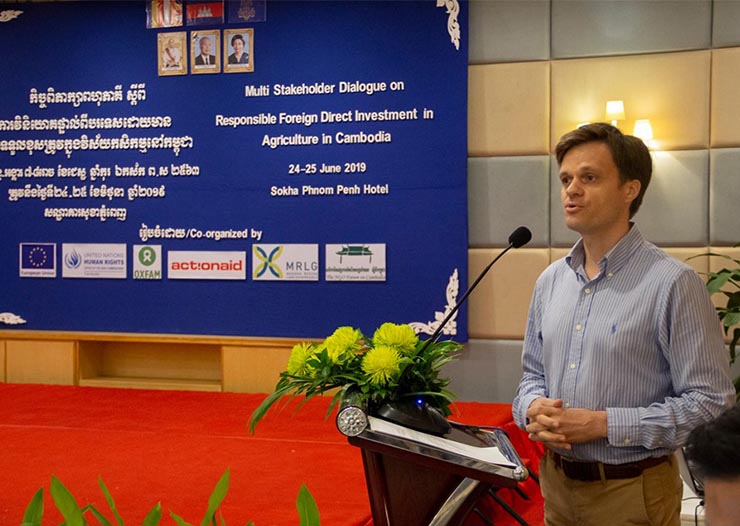
Mr. Antoine Deligne, Deputy Team Leader, MRLG program mentioned that it is a good opportunity for all key relevant stakeholders to meet during the event to discuss issues related to FDI agribusiness in Cambodia. MRLG is a program financed by the SDC to work on land governance sector in four countries such as Cambodia, Myanmar, Lao PDR, and Vietnam. He said that FDI in Cambodia, mostly from China and Vietnam, neighboring country, creates many conflicts. The responsible investment helps us to avoid conflict. A lot of efforts trying to solve the conflict, and MRLG has organized dialogue at the national level. He pointed out about potential to use the ASEAN guideline on responsible investment in agriculture as entry point.
Mr. Tom Hesketh, Consultant, presentated on the result of Study on Foreign Direct Investment in Agribusiness in Cambodia Investment application process. He mentioned that the study was conducted from June to December 2018 to develop a roadmap for engagement with private sector, to identify better practices that have been done in Cambodia by companies and understand the FDI application process in Cambodia. The study also provided policy recommendations for responsible FDI in agriculture. He presented the positive and negative impacts of the FDI in agriculture in Cambodia. The positive impacts include technology transfer, international best practices, access to larger markets, value chain development, access to foreign currency, economic development, economic spillover, job opportunities, improved infrastructure, improved food security, improved gender equality. The negative impacts are loss of biodiversity, loss of culture, land speculation, land loss & disputes, unfulfilled job promises, overuse of agricultural inputs, pollution, loss of livelihoods & rural income, loss of conservation areas, and reduced food security and gender equality.
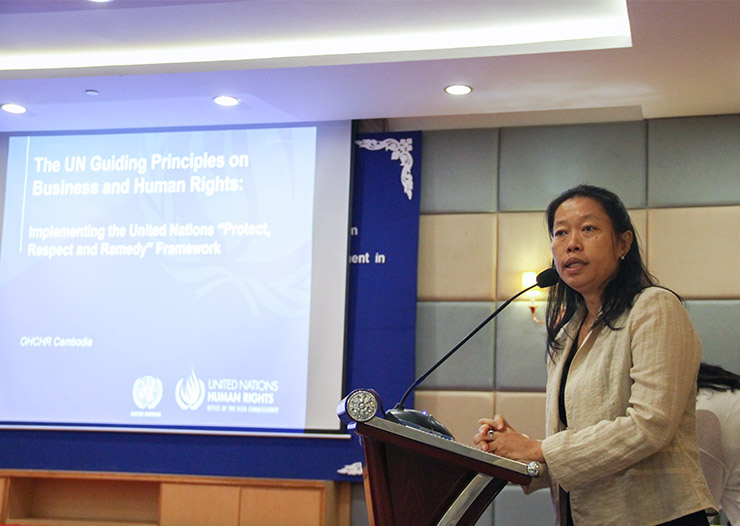
Mrs. KEAT Bophal, UN-OHCHR presented Concept and Approach of UN Guiding Principles on Business and Human Rights with key questions : Why business and human rights agenda?; What does it mean by responsible investment in general and in agribusiness specifically? She continued her presentation with deial a global normative framework for business and human right, and metioned that in 2011 the United Nations Human Rights Council unanimously endorsed the UN Guiding Principles on Business and Human Rights (UNGPs). The principles have three pillars – Protect, Respect and Remedy; and six key features: Apply to all States; All companies, of all sizes, in every sector, in any Country; Distinct, but complementary responsibility between States and companies; Elaborate on the implications of existing human rights obligations and practices for State and business; Human rights cannot be offset: doing good in one aspect cannot compensate human rights harms elsewhere; Contains “smart mix” of regulatory and voluntary approaches.
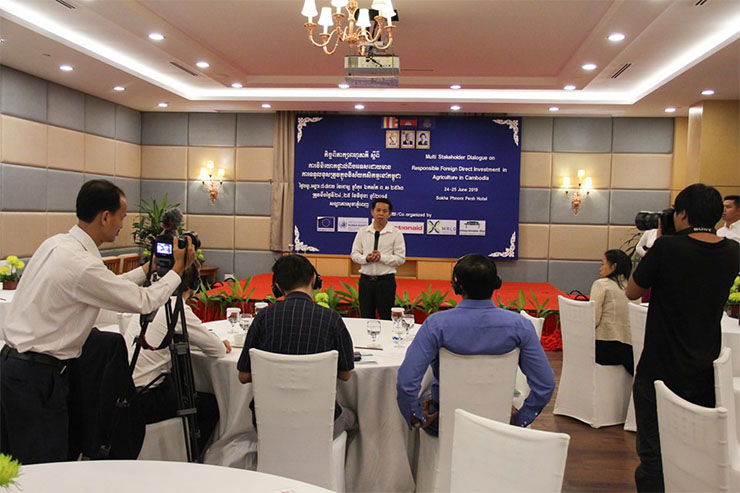
Mr. Tek Vannara, Executive Director of NGO Forum on Cambodia, mentioned that since 2015 the guideline was developed. It supports by Chinese institutions and International NGOs such as Oxfam, Global Witness, Henrichbold foundation. It links to SDG, CSR, Human Rights, and Business and FPIC. It has a transparency principle. It is a voluntary guideline to build the reputation of the company. It was lunched in Vietnam. It was translated in Khmer language. It is a good guideline. We will present it to the companies that operate in Cambodia. It will be discussed with MAFF. We will also present it in TWG-Agriculture and Water. There are soft copy both English and Khmer language. It can apply to your program work. It states in five key points. It states the relationship between NGO, community, and companies.
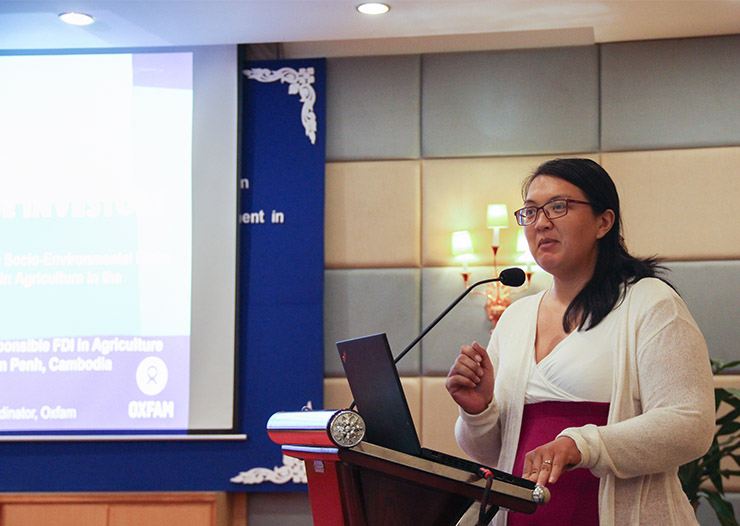
Ms. Kim Natacha presentated on Oxfam Voluntary Guidelines on Mitigating Socio-Environment Impact for Vietnamese Outward Investors. She mentioned that the the voluntary guideline is developed by a joint initiative between People and Nature Reconciliation (PanNature). The guideline is for use as information to share to Vietnamese Investor and local community affected. The training was provided to the Vietnamese company and community. Use three prong approaches. The guideline framework focuses on land, labor, environment, and culture/ Indigenous People.
Mr. Kob Math, Consultant, presented on case studies of four companies including Grandis Timber, SOCFIN, SIAT, Hoan An Yeak Lay. The case studies applied the 7 World Bank’s Principles for Responsible Agricultural Investment that Respects Rights, Livelihoods and Resources: Existing rights to land and associated natural resources are recognized and respected; Investments do not jeopardize food security but rather strengthen it; Processes for accessing land and making investments are transparent, monitored, and ensure accountability; All those materially affected are consulted, and agreements from consultations are recorded and enforced; Investors ensure that projects respect the law, reflect industry best practice, and are viable economically; Investments generate desirable social and distributional impacts and do not increase vulnerability; Environmental impacts due to a project are quantified and measures are taken to encourage sustainable resource use while minimizing the risk/magnitude of negative impacts and mitigating them. The case studies followed three step processes: study on company policies; review annual/bi-annual reports; CSR/sustainability reports; and external reports and documentations mentioning case study companies.
Conclusion
Ms. Natacha said that Oxfam in cooperation with ActionAid, MRLG, NGO Forum. We will collect all information and prepare a report and send it to all participants. We will request for cooperation.
Mr. Li Yuk Shing, Kevin, Manager- Grant Management and Review of Oxfam Hong Kong representative provided closing remarks. It is good that all participants come up with a consensus and agreement to move forward. Everyone has their own idea on how to move forward from yesterday and today discussion. More space to cooperate with difference tool to civil society to move the whole thinks. I hope you will enjoy the discussion and moving forward.